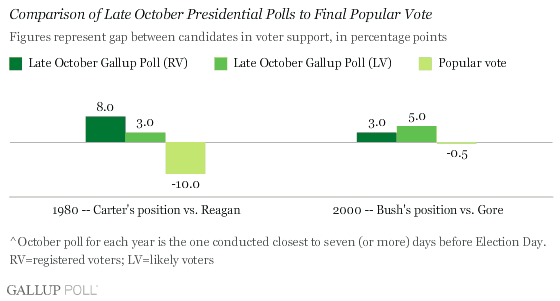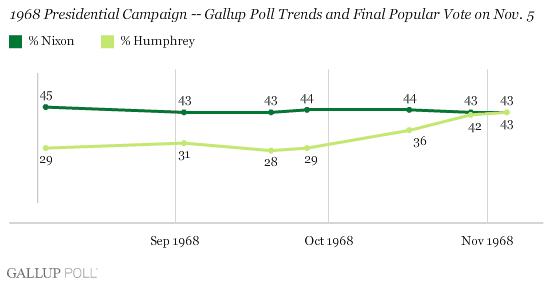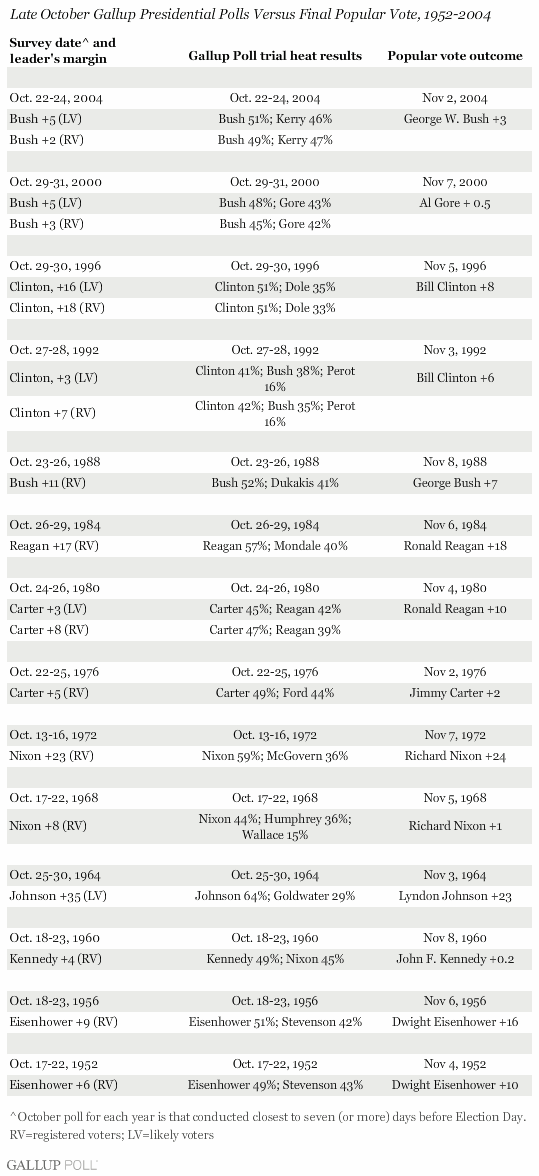PRINCETON, NJ -- There have been only 2 instances in the past 14 elections, from 1952 to 2004, when the presidential candidate ahead in Gallup polling a week or so before the election did not win the national popular vote: in 2000 (George W. Bush) and 1980 (Jimmy Carter). And in only one of these, in 1980, did the candidate who was behind (Ronald Reagan) pull ahead in both the popular vote and the Electoral College and thus win the election.

The 1980 example is not necessarily one that John McCain can hope is duplicated this year. Reagan's late-breaking surge that year is generally attributed to the only presidential debate between Carter and Reagan -- held one week before the election, on Oct. 28 -- which seemed to move voter preferences in Reagan's direction, as well as the ongoing Iran hostage crisis, which reached its one-year anniversary on Election Day. After trailing Carter by 8 points among registered voters (and by 3 points among likely voters) right before their debate, Reagan moved into a 3-point lead among likely voters immediately afterward, and he won the Nov. 4 election by 10 points.
The 2000 example may have greater similarities to the kind of upset McCain hopes to achieve. Despite Bush's generally leading position for much of the last month prior to the 2000 election, the race narrowed in the final few days, and Gore squeaked out a popular-vote victory, 48.4% to 47.9%. Of course, Gore failed to win the Electoral College vote and, thus, the election.
Races have tightened toward the end of the campaign in other years, although not to the point where the second-place candidate was able to win either the popular or the Electoral College vote. In 1968, the race between Richard Nixon and Hubert Humphrey narrowed over the last month of the campaign, from double-digit leads for Nixon in late September to only an 8-point lead for him among registered voters in polling conducted Oct. 17-22. By Gallup's final pre-election survey, conducted Oct. 29-Nov. 2, Nixon held only a 1-point edge among likely voters, and ultimately won the election on Nov. 5 by less than 1 percentage point, 43.4% to 42.7%.

The 1960 presidential election between John F. Kennedy and Nixon was extremely close, with the lead switching back and forth between the two candidates throughout the campaign. And although Kennedy won, it was by the narrowest of margins, rather than the 4-point lead he held in a Gallup Poll just days before the election.
The late campaign polling trends in every other election year since 1952 were fairly stable, and the candidate leading in the Gallup Poll in the week or so prior to the election ultimately won, either by a solid margin or very similar to what the pre-election polls suggested. This was the case in 2004, 1996, 1992, 1988, 1984, 1976, 1972, 1964, 1956, and 1952 (all but two of which involved an incumbent president seeking re-election).
Bottom Line
With only one week left in Campaign 2008, history is on the side of Barack Obama. It would be unusual -- although not unprecedented -- to see his recent 7- to 9-point leads among registered voters and 4- to 7-point leads among traditional likely voters shrink enough between now and the election to put the presidency within McCain's reach.

